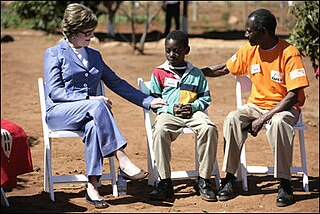
Sex education, also known as sexual education, sexualityeducation or sex ed, is the instruction of issues relating to human sexuality, including human sexual anatomy, sexual activity, sexual reproduction, safe sex and birth control, sexual health, reproductive health, emotional relations and responsibilities, age of consent, and reproductive rights. Sex education that includes all of these issues is known as comprehensive sex education, and is often opposed to abstinence-only sex education, which only focuses on sexual abstinence. Sex education may be provided as part of school programs, public health campaigns, or by parents or caregivers. In some countries it is known as "Relationships and Sexual Health Education".

Asexuality is the lack of sexual attraction to others, or low or absent interest in or desire for sexual activity. It may be considered a sexual orientation or the lack thereof. It may also be categorized more widely, to include a broad spectrum of asexual sub-identities.
Development of sexuality is a part of the development and maturation of children. It includes a range of sensory, emotional, and consequent sexual activities that may occur before or during early puberty, but before full sexual maturity is established. The development of child sexuality and the perception of child sexuality by adults is influenced by social and cultural aspects. The concept of child sexuality also played an important role in psychoanalysis.
Prison sexuality consists of sexual relationships between prisoners or between a prisoner and a prison employee or other persons to whom prisoners have access. Since prisons are usually separated by sex, most sexual activity is with a same-sex partner. Exceptions to this include sex with spouses/partners during conjugal visits and sex with a prison employee of the opposite sex.
The Family Research Institute (FRI), originally known as the Institute for the Scientific Investigation of Sexuality (ISIS), is an American socially conservative non-profit organization based in Colorado Springs, Colorado which states that it has "...one overriding mission: to generate empirical research on issues that threaten the traditional family, particularly homosexuality, AIDS, sexual social policy, and drug abuse". The FRI is part of a sociopolitical movement of socially conservative Christian organizations which seek to influence the political debate in the United States. They seek "...to restore a world where marriage is upheld and honored, where children are nurtured and protected, and where homosexuality is not taught and accepted, but instead is discouraged and rejected at every level." The Boston Globe reported that the FRI's 2005 budget was less than $200,000.
The Society for the Scientific Study of Sexuality is a 501(c)(3) non-profit professional membership organization "dedicated to advancing knowledge of sexuality and communicating scientifically based sexuality research and scholarship to professionals, policy makers, and the general public." SSSS was originally incorporated in 1966 as The Society for the Scientific Study of Sex, but in 1996, the name was expanded to The Society for the Scientific Study of Sexuality to better reflect the wide range of members' research interests and because the term "sex" was often interpreted narrowly to refer only to "sexual behavior". The membership includes anthropologists, biologists, educators, historians, nurses, physicians, psychologists, sociologists, theologians, therapists, and others. SSSS produces the Journal of Sex Research, a scholarly journal currently published by Taylor & Francis.
India has developed its discourse on sexuality differently based on its distinct regions with their own unique cultures. According to R.P. Bhatia, a New Delhi psychoanalyst and psychotherapist, middle-class India's "very strong repressive attitude" has made it impossible for many married couples to function well sexually, or even to function at all.

Abstinence-only sex education is a form of sex education that teaches not having sex outside of marriage. It often excludes other types of sexual and reproductive health education, such as birth control and safe sex. Comprehensive sex education, by contrast, covers the use of birth control and sexual abstinence.
The Archives of Sexual Behavior is a peer-reviewed academic journal in sexology. It is the official publication of the International Academy of Sex Research.
Comprehensive sexuality education (CSE) is a sex education instruction method based on a curriculum that aims to give students the knowledge, attitudes, skills, and values to make appropriate and healthy choices in their sexual lives. The intention is that this understanding will help prevent students from contracting sexually transmitted infections (STIs) such as HIV and HPV, reduce unplanned and unwanted pregnancies, as well as lowering rates of domestic and sexual violence.
The National Sexuality Resource Center (NSRC) is a San Francisco-based organization which advocates the positive representation of human sexuality, creates educational content, and provides training about human sexuality. The center also counters what it views as negative representations of sexuality while fostering dialog of sexuality issues as a natural part of being human.
Adolescent sexuality is a stage of human development in which adolescents experience and explore sexual feelings. Interest in sexuality intensifies during the onset of puberty, and sexuality is often a vital aspect of teenagers' lives. Sexual interest may be expressed in a number of ways, such as flirting, kissing, masturbation, or having sex with a partner. Sexual interest among adolescents, as among adults, can vary greatly, and is influenced by cultural norms and mores, sex education, as well as comprehensive sexuality education provided, sexual orientation, and social controls such as age-of-consent laws.
Sexual orientation discrimination is discrimination based on a person's sex, sexual orientation, gender identity, or pregnancy.

Situational sexual behavior differs from that which the person normally exhibits, due to a social environment that in some way permits, encourages, or compels the behavior in question. This can include situations where a person's preferred sexual behavior may not be possible, so rather than refraining from sexual activity completely, they may engage in substitute sexual behaviors.

Sexuality in China has undergone dramatic changes throughout time. These changes can be categorized as "sexual revolution". Chinese sexual attitudes, behaviors, ideology, and relations have especially gone through dramatic shifts in the past four decades due to reform and opening up of the country. Many of these changes have found expression in the public forum through a variety of behaviors and ideas. These include, but are not limited to the following cultural shifts: a separation of sex and marriage, such as pre- and extramarital sex; a separation of sex from love and child-bearing such as internet sex and one-night stands; an increase in observable sexual diversity such as homo- and bisexual behavior and fetishism; an increase in socially acceptable displays and behaviors of female sexual desire; a boom in the sex industry; and a more open discussion of sex topics, including sex studies at colleges, media reports, formal publications, online information, extensive public health education, and public displays of affection.
Sexual repression is a state in which a person is prevented from expressing their own sexuality. Sexual repression is often linked with feelings of guilt or shame being associated with sexual impulses. Defining characteristics and practices associated with sexual repression vary between societies and different historical periods. The behaviours and attitudes constituting sexual repression differ across cultures, religious communities and moral systems. Sexual repression can largely be categorised as physical, mental or an amalgam of both.

The Journal of Sexual Medicine (JSM) is a peer-reviewed medical journal published on behalf of the International Society for Sexual Medicine. Besides the latter society, it is also an official journal for the International Society for the Study of Women's Sexual Health. The editor-in-chief is John P. Mulhall. The related open access journal, Sexual Medicine, was launched in 2013.
In the United States, sex education is taught in two main forms: comprehensive sex education and abstinence-only as part of the Adolescent Family Life Act, or AFLA. Comprehensive sex education is also called abstinence-based, abstinence-plus, abstinence-plus-risk-reduction, and sexual risk reduction sex education. This approach covers abstinence as a choice option, but also informs adolescents about age of consent and the availability of contraception and techniques to avoid contraction of sexually transmitted infections. Every state within the U.S. has a mandated AIDS Education Program.
LGBT migration is the movement of lesbian, gay, bisexual and transgender(LGBT) people around the world and domestically, often to escape discrimination or ill treatment due to their sexuality. Globally, many LGBT people attempt to leave discriminatory regions in search of more tolerant ones.






